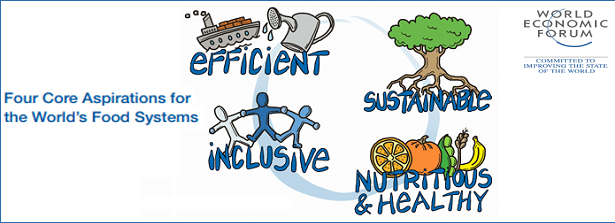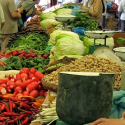The Food Systems Approach: inspiring an innovative way for SDG2 impact?

The “Food Systems Approach” was one of the buzzwords of the Wageningen University & Research SDG conference of late August, a lively international conference attended by over 700 participants from research, civil society, private and public sector. There seemed to be consensus among speakers, panelists and participants that food systems need a transition. Future food systems need to deliver better: more food needs to be available and accessible for the growing, more urbanized world population, it needs to be part of a balanced, nutritious diet, and to be produced, processed and traded in new ways in order to cope with climate change and resource scarcity.
For this transition, a Food Systems Approach (FSA) was recommended by leading WUR experts in several workshops. Siemen van Berkum, Just Dengerink and Ruerd Ruben characterize the FSA as a useful conceptual framework that links together various disciplines to inform research and policy, which aims to provide sustainable solutions for the abovementioned transition. They define a food systems approach as analyzing “the relationships between the different parts of the food system and the outcomes of activities within the system in socio-economic and environmental/climate terms.”1
So, what did the conference discussions deliver? The answer to that may be pessimistic, optimistic or even full of inspiration.
| Documents to download |
|
The pessimists’ view: nothing new here
Let’s start with the pessimist view. These discussions are not new at all. That agriculture needs to deliver on nutrition was part of my own nutrition studies at WUR in the late eighties. No need to revisit that, even though some production-focused institutions may need to adapt their orientation and their practice to deliver on nutrition. Working in an integral manner, based on a proper context analysis at the local level and beyond: this is a recommendation for effective international cooperation policy and practice since decennia. Most development experts know this and also know it is not so easy, as silos or rigid matrix models in programs or institutions hinder realizing comprehensiveness in practice. No need to revisit this either. Just train those who are not familiar with these “old principles”.
The optimists’ view: the FSA stimulates innovation and improvement
Nevertheless, sharing knowledge about how an integral approach could actually work in practice makes sense. During a parallel session of the WUR conference co-hosted by the Ministry of Agriculture, Nature and Food Quality and the Food & Business Knowledge Platform, four organizations presented their application of food systems elements in their work in Africa. The practical experiences of these organizations showed progress in tackling several dimensions of the food system in an integral manner. This gives room for optimism. Programmes starting out with a ‘narrow’ economic objective (e.g. developing a particular agrofood sector as a source of income for farmers and other companies) were able to gradually evolve into more complex and holistic interventions. This was the case for the Sesame Business Network in Ethiopia and the Kenya Market-led Dairy Programme. Programmes implemented by ECDPM and Hivos showed that the participation of citizens and farmers, whose livelihoods were under pressure, strengthened the integrality and effectiveness of food systems research and interventions. Though these are small steps, there is progress. The FSA as a lens could work, and it inspired stakeholders to take ideas of others on board.
What inspired me: the FSA as an inclusive negotiation tool
I was even further inspired in a session on synergies and trade-offs between SDGs, hosted by KIT. Organizations and researchers presented cases of positive and negative interactions between SDGs, and explained how tensions were managed. A case by WUR’s Animal Production Systems Group on the food-water-energy nexus showed the biggest driver for trade-offs was the increased demand for bio-energy, while the biggest opportunity for synergies would be reducing food wastage. Trade-offs discussed by other teams included the environmental and health effects of pesticide use and the tensions between companies’ short term profit and longer term impact.
In the discussion that followed, participants concluded that the weighing of different interests, including decision-making on trade-offs, cannot be done by academic institutions or governments alone. It is a societal process that needs to involve all stakeholders concerned at local, national and/or international level. Existing negotiating platforms can be used for this, but need to be properly equipped, as they lack tools, capacities and research while in practice these spaces should become more inclusive, level playing fields. Farmers and consumers are often among the least powerful players if represented at all.
Achieving truly inspirational food systems innovations
This means there is more work to be done. First, to further understand how a FSA could help overcoming key food systems bottlenecks with focused, evidence-based interventions. The Dutch Ministries of Foreign Affairs and Agriculture, Nature and Food Quality are doing just that, with a pilot on the use of the FSA for strategic country planning by embassies. Second, to develop adequate multi-stakeholder mechanisms for decision making on managing the synergies and the inevitable trade-offs. If we can achieve this, truly inspirational food systems innovations needed to achieve SDG2 will follow.
_ _ _
Background information
Further reading about the WUR SDG conference:
Further reading on Food Systems:
- Siemen van Berkum, Just Dengerink and Ruerd Ruben, 2018. The food systems approach: sustainable solutions for a sufficient supply of healthy food. Wageningen, Wageningen Economic Research, Memorandum 2018-064. 32 pp.; 9 fig.; 0 tab.; 39 ref. https://knowledge4food.net/food-systems-approach-report/
- UNEP & IRP Report 2016. Food Systems and Natural Resources. http://www.resourcepanel.org/reports/food-systems-and-natural-resources
- Transforming Food Systems for Improved Nutrition. Highlights of lunch meeting June 29, 2017 at Ministry Foreign Affairs. https://knowledge4food.net/transforming-food-systems-improved-nutrition/
- WUR Workshop 2016. “The Future of Food Systems”: https://knowledge4food.net/report-future-food-systems/
- World Economic Forum, 2017. Shaping the Future of Global Food Systems: A Scenarios Analysis. https://www.weforum.org/whitepapers/shaping-the-future-of-global-food-systems-a-scenarios-analysis
Footnotes
- 1. Siemen van Berkum, Just Dengerink and Ruerd Ruben, 2018. The food systems approach: sustainable solutions for a sufficient supply of healthy food. Wageningen, Wageningen Economic Research, Memorandum 2018-064. 32 pp.; 9 fig.; 0 tab.; 39 ref. https://knowledge4food.net/food-systems-approach-report/






